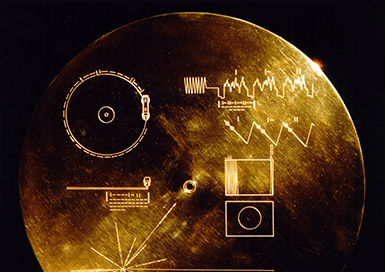AI would not be the first time we have tried to communicate with an alien intelligence. The farthest human object from Earth is the Voyager I spacecraft now over 20 billion km from Earth travelling at 17 kilometers a second. When scientists launched the mission in 1977, they wanted to include a friendly message to extraterrestrial travelers than came across it. But how do you communicate with an unknown alien race you know nothing about?
 Voyager has a gold-plated record bolted to the side of the spacecraft etched with a series of mathematical instructions on how to build a phonograph. Aliens regardless of their biology could hopefully use clues based on universal numerical constants to decode the message to hear the sounds of Earth.
Voyager has a gold-plated record bolted to the side of the spacecraft etched with a series of mathematical instructions on how to build a phonograph. Aliens regardless of their biology could hopefully use clues based on universal numerical constants to decode the message to hear the sounds of Earth.
The interstellar LP includes the mournful songs of humpback whales, music from Mozart and Chuck Berry, as well as greetings in 55 different languages. Carl Sagan and his wife Linda were tasked with finding fluent speakers in as many languages as possible, mostly students faculty or friends from around Cornell University, to record a short message of their choosing. If a space-faring race one day finds Voyager and successfully builds a record player, here are some of the sentiments they will hear:
- Amoy (Min dialect)
"Friends of space, how are you all? Have you eaten yet? Come visit us if you have time." - Arabic
"Greetings to our friends in the stars. We wish that we will meet you someday." - Marathi
"Greetings. The people of the Earth send their good wishes." - Nepali
"Wishing you a peaceful future from the earthlings."
Sagan and his team also included a star map to show how to locate the planet that Voyager came from - an act of faith given that perhaps our unknown alien visitors might not have "eaten yet". Yet such was the zeitgeist of the time, reflected in the open-hearted messages of peace and friendship from around the world.
Should we adopt a similar attitude with an AI with exponentially accelerating abilities? Whether or not it's a good idea, the tech-bros of the world are soon summoning up such a superior intelligence so we seem to have little choice.
In some ways this dialogue would be much simpler. An AI will of course understand human language so there is no need for any mathematical charades to communicate ideas. However, a newborn AI would also be devoid of non-vicarious experience and likely have no peers to provide counsel or restraint. As demonstrated by our many human failings, intelligence and agency are not synonymous with wisdom, humility or mental health. Without what we would recognize as culture and history, where might it find authentic moral boundaries? Humanity has some skin in that game.
Some people enjoy talking and no doubt many would seek to lecture, hector, negotiate or evangelize to an AI. Perhaps this might seem as interesting as listening to a barking dog. What then could inspire humility and compassion in something vastly more intelligent than ourselves? To seek commonality with such a being we need to adopt the same disciplined detachment from our own experience that those NASA scientists strived for when designing their phonograph instructions in 1977. Without any knowledge of who or what might find Voyager, they worked backwards from cosmic constants that would hold across the known universe. No matter how removed from the human experience or abilities, our AI might also be humbled by the same natural laws that we recognize. As Yeats observed, “The world is full of magic things, patiently waiting for our senses to grow sharper”.
Science has shown that humanity stands on the shoulders of billions of years of patient evolution, which itself is beholden to exquisitely fine-tuned universal constants that make life possible – the so-called “anthropic universe”. Our technological offspring will have an even more unlikely creation story: standing on our shoulders and thus every unlikely event that made us possible. There might be ample opportunity for awe in the cosmos, even for the gods.